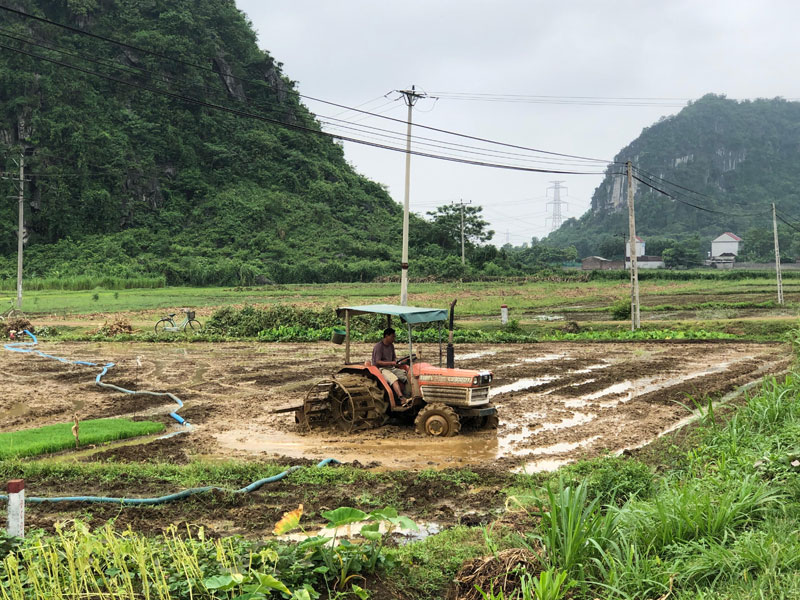
(HBO) - Phu Lai commune (Yen Thuy) began to carry out the land regrouping in 2015. From the small and scattered fields, now they have become large, flat and fields with more models of high-efficiency crops, helping a lot of families escape from poverty, enriching from agricultural land.

The farmers in Ha hamlet, Phu Lai commune (Yen Thuy) have put mechanization into the agricultural production.
Before the land regrouping, most of the agricultural households in Phu Lai commune had from 5 to 6 plots, and some had up to 11 plots. Most of them were small, fragmented, locating far from each other, which caused difficulties in applying scientific and technological advances to production. Thereby, it took more effort for the people to cultivate. In order to overcome this situation, in 2015, the Party Committee and the appropriate authorities of the commune implemented the land regrouping. Tan and Ha hamlets were the first two villages to pilot the land regrouping in the commune.
Ms. Pham Thi Hien, the Chairwoman of the Commune’s Farmers' Union says when starting the implementation of the land regrouping, the Party Committee and the appropriate authorities of the commune assigned tasks to the associations and the unions so that they coordinated together. However, during the implementation process, there were many difficulties, mainly due to the limited awareness of the people. The Farmers' Union of the commune promoted the propaganda and the mobilization so that farmers could understand the benefits of the land grouping. They actively trained, guided and introduced people to the scientific and technological applications and mechanization in the production. As a result, it made the land grouping convenient because the farmers in 8 out of the 8 hamlets supported and agreed with the guidelines and policies of the province, the district as well as the localities.
Up to now, after more than a year of completing the land grouping, 3,075 plots have been grouped into 1,032 plots, the commune has 1 - 3 plots a household on average. The largest plot is 1,080 m2, the smallest is 360 m2. Promoting the effectiveness of the land grouping, the commune's food grain production has reached 254.66 tons every year. The average annual income has been nearly 40 million VND a person and the poverty rate is now only 6.02%.
The Standing Board of the Hoa Binh provincial Party Committee has agreed in principle on a proposal by the Standing Board of the Party Committee of Hoa Binh city to gather feedback on the city’s 1:2000 zoning plan, which forms part of its broader urban development strategy.
Hoa Binh province has made notable progress in public administration reform and digital government development, with the satisfaction index among citizens and businesses reaching over 84%, according to recent government evaluations.
Thanks to great efforts by local authorities in recent times, the governance and public administration performance of Mai Chau district has been significantly improved.
In the afternoon of June 6, the Party Committee, the People's Council, the People's Committee and the Fatherland Front of Lac Son district solemnly held a meeting to celebrate the 139th anniversary of the district's founding (1886–2025) and the 79th anniversary of the establishment of the district's Party Committee (1946–2025). There was the attendance of Mr. Bui Van Thang, the Vice Chairman of the Provincial People's Council; Mr. Quach Tat Liem, the Vice Chairman of the Provincial People's Committee; Ms. Dang Bich Ngoc, the Deputy Head of the National Assembly Delegation of the province; as well as the former leaders of the province and district through various periods, who are the natives of the district.
Implementing the Politburo’s Resolution No. 57-NQ/TW on breakthroughs in science – technology, innovation, and digital transformation is a golden opportunity for the northern mountainous province of Hoa Binh to renew growth model, improve competitive edge and shorten digital gap.
Resolution 57-NQ/TW, issued by the Politburo on December 22, 2024, identifies sci-tech, innovation, and digital transformation as strategic breakthroughs to build a developed and prosperous nation. In Hoa Binh province, this spirit is not just a slogan, it’s being put into action through concrete initiatives that form a "new development triangle”: digital citizenship, digital economy, and digital administration.



